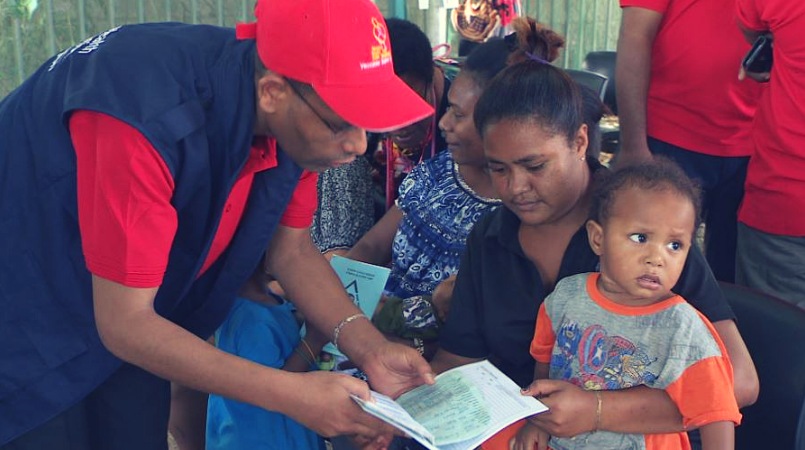
A major nationwide vaccination campaign against measles, rubella and polio diseases was launched on Friday in Port Moresby by the National Department of Health.
This was supported by UNICEF and the World Health Organization.
The campaign aims to vaccinate more than 1.3 million children in the age group of 6 months to 5 years with measles and rubella (MR) vaccines, and then children from birth to 5 years with oral polio vaccine (OPV).
This exercise further demonstrates Papua New Guinea’s commitment to improve health and well-being of its children by protecting them against vaccine-preventable diseases.
Measles is a highly infectious disease that can spread quickly among young children. Any person, young or old, who has not been immunised, can be easily infected by measles. It is caused by a virus spread by coughing, sneezing, close personal contact or direct contact with infected nasal or throat secretions. Measles kills more children than any other vaccine-preventable disease.
Rubella, although it looks mild, has severe consequences. A pregnant woman that becomes infected with this disease during the first 14 weeks pregnancy has a high chance of passing the virus to her unborn child.
The baby will then have a 90 percent chance of having congenital rubella syndrome (CRS) at birth. A baby born with CRS may have multiple defects, including heart disorders, blindness, deafness or brain damage.
Polio is an infectious disease transmitted from an infected person through water or food that has been contaminated with faecal materials. It is a highly dangerous disease that permanently paralyses or kills. It has no cure, but it can be prevented through vaccination.
In his key note address, the Secretary for Health, Pascoe Kase, acknowledged the immense contributions of all stakeholders in the previous rounds of polio vaccination, while calling for immunisation of children in Papua New Guinea to be treated as the days when the welfare of every child was responsibility of the entire community.
“In our traditional societies, it took a village to raise a child, and this ensured the preservation of the entire village; it’s about survival of a tribe, community and the country,” said Kase.
He further appealed to the people of PNG to play their part in ensuring children receive their routine immunisation antigens that are offered free-of-charge in all government and church-run health facilities.
He added that in the upcoming campaign, there is need to ensure every child in the target age group is vaccinated against measles, rubella and polio.
In response, the UNICEF Country Representative in PNG, David Mcloughlin, reiterated UNICEF’s avowed commitment to the rights of PNG children, including access to immunisation services.
He particularly praised the resilience, commitment and dedication of thousands of health workers, social mobilisers and volunteers across the country, which have reflected in the progress so far in stopping polio transmission in the country.
Mcloughlin noted: “While we have collectively made progress in so far stopping the transmission of polio virus in PNG, the country’s children face yet another threat from two vaccine-preventable diseases: measles and rubella, which is reason for the upcoming nationwide vaccination campaign.”
He therefore urged caregivers to take their children to the nearest vaccination centre to receive these lifesaving vaccines.
Meanwhile, the World Health Organization says based on a recent assessment of the polio outbreak response, Papua New Guinea has made great progress in stopping the transmission of polio since the outbreak in June 2018.
“We congratulate the Papua New Guinea government led by the National Department of Health and all the Provincial Health agencies for this achievement,” said Dr Luo Dapeng, WHO Representative in Papua New Guinea.
“To all our partners, we thank you for your investment in health and we invite you to join us once again in this massive endeavour to protect children from vaccine preventable diseases.
“And to all parents and guardians, vaccines are safe and we appeal to you to bring your children to be vaccinated against measles, rubella and polio.”
Dr Luo reaffirmed WHO’s commitment to the Government of PNG in delivering results and in raising healthy and happy children, adding that routine immunisation is the way forward.
Unlike the polio vaccines, which will be administered orally to children from birth to age 5, the measles-rubella vaccine will be administered by injection for children aged 6 months to 5 years.
